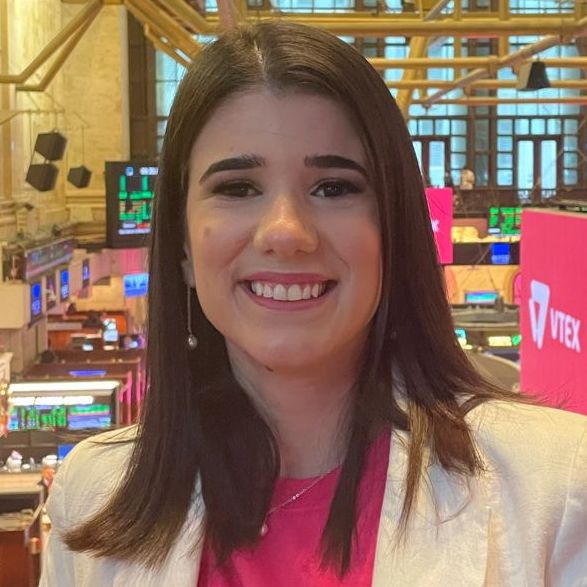
If you are not changing, you will be falling behind pretty soon.
You may remember companies like Polaroid, Kodak, and others that were highly successful at one point, but know your fame is just a memory. One of the things that made them fall behind their competitors was their lack of skill to change before it was too late. For any company, the ability to continuously transform itself is mandatory to keep business alive.
For companies in such a dynamic environment like VTEX, the main difference is leadership behavior. The difference between a good leader and a great leader is learning to anticipate instead of being a bystander while the market as they know it changes around.
I go even further by saying that having leaders who adopt a forward-thinking mindset is crucial for companies to thrive. If you think about the five companies that currently have the highest market cap, you will see that 4 out of 5 are broadly known for constantly planning how to address the needs their clients will have in the next ten or fifteen years.
While it is impossible to foresee the future, anticipating puts leaders and companies in such a position that they are more prepared to brace the challenges in the years to come.
And how to adopt a style of leadership that thinks ahead? Though I am not an expert, I have some life experience to share that can be helpful for those who desire to be more prepared to face the demands of a constantly changing market.
This article will share three aspects that can help you become a leader who plans and organizes your teams (and the company itself) for what’s next.
1) Develop a radical awareness approach
As a leader, you need to develop situational awareness with an honest assessment of the present snapshot of your organization.
Creating a communication channel where people can give honest and constructive feedback about everything (mission, vision, product, processes, and people) is a way to introduce and foster this culture in your team.
Study your colleagues and how they work. And be honest with your organization about what projects and methodologies are being successfully executed. Do the opposite as well.
A leader who wants to excel in anticipatory leadership should not:
- Find it hard to receive feedback;
- Answer more than asking;
- Speaking more than listening;
- Make too many assumptions and do not innovate.
It is essential to always keep in mind that what you and your team know may be wrong.
2) Learn to identify opportunities and threats
As leaders, we need to improve our skills to detect ambiguous threats and opportunities for the organization where we work. A forward-looking person is always vigilant, enhancing their ability to anticipate by scanning the environment for change signals.
This type of person pays attention to different aspects that might affect (for better or worse) the company, besides talking to team members, stakeholders, customers, and other leaders to understand their challenges and how they can impact the market and the way its team works.
If you want to adopt this attitude, talk to different people that work at a similar company to yours, write down your findings, and start training yourself to try out some predictions about what’s coming — even if they prove themselves wrong in the future.
The only way to be good at forecasting new trends is by gathering information from different sources and fine-tuning your perceptions through trial and error.
3) Embrace and promote innovation
The most remarkable ideas are born in the middle of the biggest problems by disrupting what exists and creating a better, more comprehensive solution.
Don’t be afraid to break the rules — the greatest innovators do this. What do Elon Musk, Steve Jobs, and Sheryl Sandberg have in common? Besides the fact that they make a lot of money, they see opportunities before others.
Do you have a hunch? Or a theory? A vision of a product or service that has the potential to be something better and more meaningful? When possible, try this new idea of yours. And if it fails, face it like a learning experience, not a failure.
Things are changing at a fast pace. Don’t be a leader who reacts, be someone who anticipates. Embracing the discomfort of change and innovation creates what we call the future. And you definitely can be part of it.
Being a leader who anticipates doesn’t mean being over-confident or being a know-it-all person. On the contrary: you should be asking more questions than answering. This way, it is possible to make better-informed decisions.
Bonus tip: don’t rely only on what’s always been true
I want to finish this article with three questions you should always ask yourself:
- What is the actual current situation of your organization?
- If you had the opportunity to start fresh, what are the things you are doing that you would not do?
- If your organization had only just six months to reach breakeven, what would you attempt to make it thrive?
I’m aware that adopting this approach demands a considerable effort to remind yourself to constantly explore different perspectives, think about how they can alter your reality, and make backup plans for different scenarios.
But I believe that it is better to be prepared and have a chance to make it through a problem or crisis than to be defeated without the opportunity of trying because you were caught off guard.
Here at VTEX, we adopt an anticipating mindset by developing solutions that can beat our clients’ challenges in the next few years. If you like to solve the most complex engineering problems and desire to work for a forward-thinking company, take a look at our career page and check out our job opportunities.













